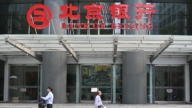【新唐人2011年9月17日讯】中共总理温家宝在达沃斯论坛上,再次提出“党政分开”、改变“以党代政”的政治体制改革,引起海内外讨论。学者们指出,温家宝只是在空谈政改,没人指望空喊口号能打破中共一党专制。也有分析认为,国内和香港媒体暗示温家宝的讲话有回击朱镕基批评的意味。
《南方报网》转发9月14号温家宝的讲话,所用的标题是“温家宝(说):对中国发展 有人看好有人唱衰”。《新华网》15号也以类似标题作了报导。温家宝在讲话中罗列了他主政期间一系列的政绩。
《参与网》的分析认为,温家宝的讲话,开始反击朱镕基的批评。近期出版的《朱镕基讲话实录》发表了朱镕基对严重的通货膨胀、房地产泡沫的警告,以及对浮夸作风的批评。
《南方周末》8号刊发了朱镕基的讲话,其中一篇题为《如果不去关心人民的疾苦,我当什么总理》。《路透社》引述评论认为,这带有很浓批评温家宝的味道。
于建嵘(中国社会科学院社会问题研究中心主任):“所以有些人当然这么阐述朱镕基的讲话,就否定了温家宝的十年的执政了,可能有这个想法。当然,我认为不宜这样去揣摩。现在问题比较严重啊。”
朱镕基新书对当前房地产政策的批评引起舆论哗然。今年4月22号,83岁的朱镕基到清华大学与师生座谈,首次为“分税制”改革造成的“国富民穷”推卸责任。
而《路透社》报导说,专家们认为朱镕基也许应为他总理任内推行的税收改革受到批评,这项改革迫使各省政府推动土地买卖来增加收入,引起目前的房地产价格泡沫。
草庵(政治经济评论家):“当然,朱镕基当时采取分税制迫不得已,朱镕基往往采取计划经济的手段来治理中国。至于房地产的事情,朱镕基是明明预见到了房地产,但是,在他的任上却出台一个重要的制度,就是开发房地产,其实最主要的就是卖地财政、土地财政。”
《参与网》的分析认为,因为朱镕基新书和他4月份在清华,公开对温家宝主持的政务进行了不点名批评,温家宝也开始不客气的进行反击。现任总理与前任总理“打架”,这一中共前所未有的怪事,必将对中共政局和十八大产生重大影响。
另一方面,最近《维基解密》公布美国外交电文披露,温家宝多次在公开场合,赞赏西方自由民主等普世价值,遭到吴邦国、贾庆林,李长春和周永康等中共保守势力的批驳和围攻。
温家宝14号在达沃斯论坛上,再次提出“党政分开”、司法独立、扩大基层选举、推进财产申报等政治改革主张。
张凯臣(前中共沈阳市委宣传部联络部长):“中国的问题本质是什么呢?本质的问题一定是打破中共的一党专制。温家宝所讲的一切话,他一切讲话都没有超出邓小平讲话的范畴。”
《炎黄春秋》主编杨继绳对《美国之音》说,中国政治改革很紧迫,不改不行啦,不论是知识界还是党政干部都有一种紧迫感。不过,他认为, 那些政改主张应该属于温家宝个人看法。
张伟国(香港《动向》杂志主编):“共产党今天变成了一个利益集团,维护它的既得利益变成了它的一个最高的目标和最大的追求,政治改革已经排不上议事日程。”
北京宪政学者陈永苗表示,温家宝发表了太多的政治改革呼吁,这种光说不做的政改呼吁,老百姓只当是在演戏,已经没办法对他有期待了。
陈永苗(北京宪政学者):“一个很清楚的判断就是说,政改就是要消灭党的领导,那么你在党的领导之下消灭党的领导,那怎么可能的事情呢?”
温家宝有关政改讲话,引起国内网民的热烈议论。网友“帖文联播”表示,温家宝至少昭示了当今中国残酷的事实:一是贪污腐败极其严重,二是并非依法治国,三是司法不公正,四是社会没有公平正义,人民没有民主权利,五是民众对国家没信心。他指出,只有全民参与的变革,才能让这个国家回到民众的手中。
新唐人记者常春、李元翰、周天采访报导。
Wen’s Empty Talk on Reform
Chinese Premier Wen Jiabao mentioned again the political
reform of the “separation of party and government"
and changing the current situation of
“the party ruling on behalf of the government” at the Davos Forum.
This has raised discussions in China and abroad.
Scholars pointed out that Wen’s political reform is just empty talk,
and no one expects slogans alone can destroy the one-party
dictatorship of the Chinese Communist Party (CCP).
Some analysts believe that the Chinese and Hong Kong media
have implied that Wen’s speech was made to refute ex-Premier Zhu Rongji’s criticism.
Nanfang Daily websites published Wen’s speech made on
September 14, with the title “Wen Jiabao: Some are Optimistic about China’s Development and some are Pessimistic."
Xinhua News also reported on his speech on September 15.
In his speech, Wen listed a series of political achievements during his term.
Canyu website analyzed that Wen’s speech counterattacked
Zhu Rongji’s previous criticism.
The recently published “Zhu Rongji’s Speeches" mentioned
Zhu’s warnings against a serious inflation,
the real estate bubble and his criticism of the proneness to
boasting and exaggeration.
Southern Weekend published Zhu’s speeches on September 8.
One of the articles is entitled “If not caring about People’s Suffering, How Could I be a Premier."
Reuters quoted comments saying that this article criticizes Wen.
Yu Jianrong (Director of Issues Research Centre at Chinese Academy
of Social Sciences): So, some people interpreted Zhu’s speech as negating Wen’s decade of governing China.
Of course, I don’t think it is appropriate to interpret like this.
It is now a serious problem. “
Zhu’s criticism on the current real estate policy
has caused a public outcry.
On April 22, 2011, 83-year-old Zhu Rongji held a symposium
with teachers and students at Tsinghua University.
For the first time, he passed the buck regarding the “tax sharing" reform
that caused “a wealthy nation with poor citizens".
Reuters reported that experts believe that Zhu should be criticized
for the tax reform implemented during his term as premier.
This reform has forced the provincial governments to promote
the sale of lands to increase their revenues, causing the current real estate price bubble.
Cao’an Jushi (political and economic commentator): “Of course,
Zhu was forced to implement the tax system.
Zhu often used a planned economy to govern China.
He clearly foresaw the real estate problem, but, during his term, an important policy was introduced.
It was to develop real estate, principally land finance."
Canyu website analyzed that as Zhu criticized Wen’s administration
in his new book and in his speech made in April at Tsinghua University, Wen has begun his relentless counterattack.
It is an unprecedented strange affair within the CCP that
the premier and former premier “fighting.”
This will certainly have a significant political impact on
the CCP’s political situation and its 18th Congress.
The U.S. diplomatic cables recently released by WikiLeaks revealed
that Wen has praised universal values,
such as the Western liberty and democracy,
on many public occasions.
Wen was criticized and besieged by the CCP’s conservative forces,
including Wu Bangguo, Jia Qinglin, Li Changchun and Zhou Yongkang.
On September 14 on Davos Forum, Wen once again advocated political reforms,
such as “separation of the party and government,”
an independent judiciary, expansion of grassroots elections
and the promotion of property declaration.
Zhang Kaichen (former Shenyan Municipal Propaganda Department head): “What’s the essence of China’s problems?
The CCP’s one-party dictatorship must be destroyed.
All the speeches made by Wen did not exceed the categories
of the speeches of Deng Xiaoping.
Editor-in Chief of Chronicles of History, Yang Jisheng told
Voice of America that China’s political reform is urgent.
The reform must be implemented. The intellectuals,
CCP cadres and the military all have a sense of urgency.
However, he believes that the political reforms advocated by
Wen should only be his personal views.
Cheung Wai Kwok (Hong Kong’s Trend magazine editor-in-chief):
“The CCP has turned into an interest group.
The protection of its vested interests is now its top goal and greatest pursuit.
Political reforms are off its agenda."
Beijing-based constitutional scholar Chen Yongmiao said that
Wen had advocated political reforms so many times in the past.
However, these are only empty talks.
The people now see him as performing and they are unable to expect anything from him.
Chen Yongmiao (Beijing-based constitutional scholar):
“Political reforms are aiming to eliminate the party’s leadership.
How could you destroy the CCP’s leadership,
when you are being led by it?"
Upon learning that the Governor of Calif. was coming to visit,
Wen’s speeches on political reforms have sparked
heated discussions among Chinese netizens.
A netizen nicknamed “Tiewen Lianbo” said that at least
Wen opened acknowledged the harsh reality of today’s China:
First, corruption is extremely serious;
second, there is no rule of law; third, judicial injustice;
fourth, no social justice or democratic rights;
and fifth, people have no confidence in the state.
He noted that only with the people involved in making the changes,
can this country return to the people’s hands.
NTD reporters Chang Chun, Li Yuanhan and Zhou Tian






























